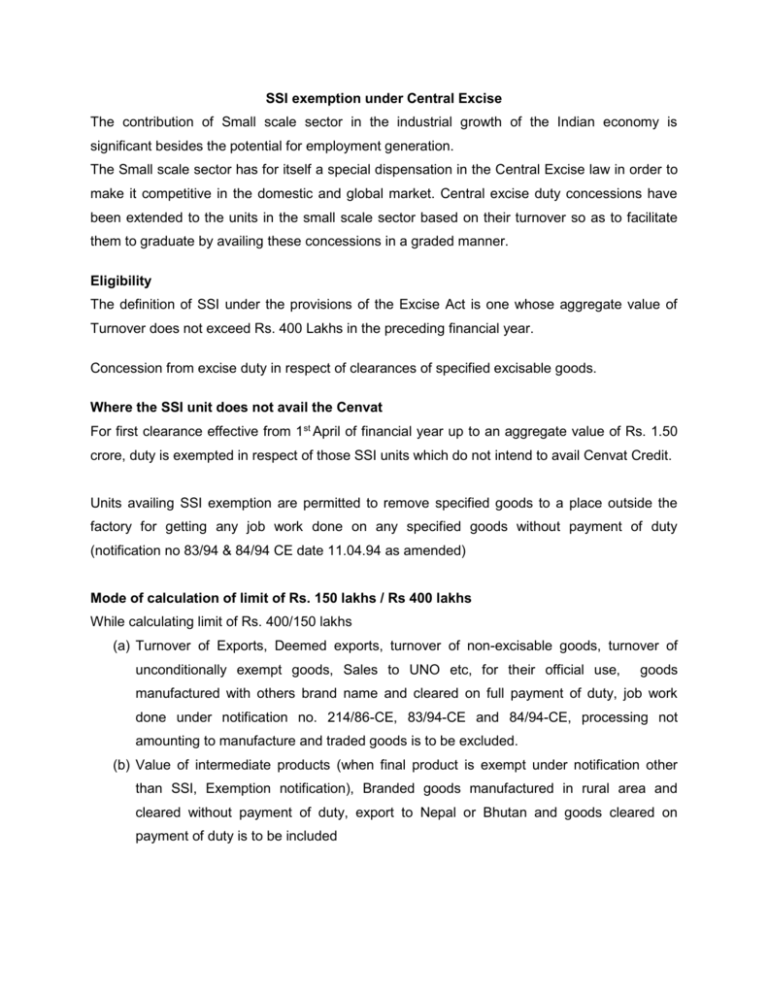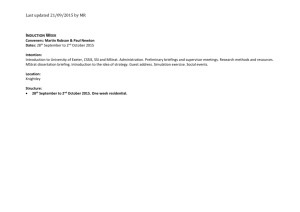SSI exemption under Central Excise The contribution of Small scale
advertisement

SSI exemption under Central Excise The contribution of Small scale sector in the industrial growth of the Indian economy is significant besides the potential for employment generation. The Small scale sector has for itself a special dispensation in the Central Excise law in order to make it competitive in the domestic and global market. Central excise duty concessions have been extended to the units in the small scale sector based on their turnover so as to facilitate them to graduate by availing these concessions in a graded manner. Eligibility The definition of SSI under the provisions of the Excise Act is one whose aggregate value of Turnover does not exceed Rs. 400 Lakhs in the preceding financial year. Concession from excise duty in respect of clearances of specified excisable goods. Where the SSI unit does not avail the Cenvat For first clearance effective from 1st April of financial year up to an aggregate value of Rs. 1.50 crore, duty is exempted in respect of those SSI units which do not intend to avail Cenvat Credit. Units availing SSI exemption are permitted to remove specified goods to a place outside the factory for getting any job work done on any specified goods without payment of duty (notification no 83/94 & 84/94 CE date 11.04.94 as amended) Mode of calculation of limit of Rs. 150 lakhs / Rs 400 lakhs While calculating limit of Rs. 400/150 lakhs (a) Turnover of Exports, Deemed exports, turnover of non-excisable goods, turnover of unconditionally exempt goods, Sales to UNO etc, for their official use, goods manufactured with others brand name and cleared on full payment of duty, job work done under notification no. 214/86-CE, 83/94-CE and 84/94-CE, processing not amounting to manufacture and traded goods is to be excluded. (b) Value of intermediate products (when final product is exempt under notification other than SSI, Exemption notification), Branded goods manufactured in rural area and cleared without payment of duty, export to Nepal or Bhutan and goods cleared on payment of duty is to be included (c) Value of turnover of goods exempted under notification (other than SSI exemption notification or job work exemption notification) is to be included for purpose of limit of Rs. 400 lakhs, but excluded for limit of Rs. 150. Eligibility for SSI Unit whose turnover was less that Rs. 400 lakhs in previous year are entitled concession to full exemption up to Rs. 150 lakhs in current financial year. SSI unit can avail Cenvat credit on inputs and input services only after it starts paying duty. However, Cenvat credit of capital goods can be availed even if these were received during period of exemption. Articles eligible Broadly, items generally manufactured by SSI are eligible for SSI exemption. for SSI Items like pan masala, matches, watches, tobacco products, Power driven exemption pumps for water not confirming to BIS, products covered under compounded levy scheme etc. are specifically excluded, even when these can be manufactured by SSI. Some items like automobiles, primary iron and steel etc. are not eligible for SSI exemption, but anyway, these are beyond capacity of SSI unit to manufacture. SSI mfing goods Goods manufactured by an SSI unit with brand name of others are not with other’s eligible for SSI concession, unless goods are manufactured in a rural area. brand name not However, SSI exemption will be available to packing material even if it bears eligible brand name of other person. Procedural SSI units eligible for SSI concession are required to pay duty on quarterly relaxations basis and file quarterly return even if they do not avail the SSI exemption Turnover of all Turnover of all units belonging to a manufacturer will be clubbed for units of same calculating SSI exemption limit. manufacturer to be clubbed Clubbing if units If two SSI units are genuinely independent, they are eligible for SSI are one in reality exemption, even if some or even most partners/directors are common. Financial control, flow back of profits and unity of interest are the major tests to determine whether turnover of two units is required to be clubbed. Availment of SSI Exemption Vis-à-vis Payment of Duty: Before adopting the exemption, the assessee requires to do the feasible study whether to avail the exemption or to pay the duty form Rs.1. The various factors to be considered in the feasible study are as follows. a) Type of Contract – Whether Inclusive of Duty / Exclusive of Duty b) Sources of Purchase of Inputs – Whether from Manufacturers / Dealers / Traders c) Eligibility of CENVAT Credit to the Customer d) Quantum of CENVAT Credit available on the Capital Goods used in the course of manufacturing After considering the above facts, the manufacturer would come to a conclusion whether to claim exemption or to pay the duty. Following table summarizes how Tax Planning can increase profit to the manufacturer in claiming of exemption. Sl. Particulars No Option I : To claim the Option II: To pay Exemption Duty from Rs.1 (in Rs) (in RS) 1. Basic Value of goods cleared Rs.10 lakhs 10 lakhs 2. Excise Duty (@ 12%) - 1.2 lakhs 3. Total Selling price to the customer Rs.10 lakhs Rs.11.2 lakhs 4. Purchase value of the material Rs.6 lakhs Rs.6 lakhs 5. Value of the Overheads Rs.2 lakhs RS.2 lakhs 6. CENVAT Credit involved in 4 & 5 Rs.0.6 lakhs Rs.0.6 lakhs 7. Cost of Goods Sold Rs.8.6 lakhs Rs.8 lakhs 8. Profit to the manufacturers (in Tax Rs.1.4 lakhs Rs.2 lakhs Extra Contracts) Decision: Not to claim the exemption and pay Duty from Rs.1 as it saves Rs.0.6 lakhs for 10 Lakhs 9. Profit to the manufacturer (in Tax Rs.1.4 lakhs Rs.0.80 lakhs Inclusive Contracts) Decision: Claim the exemption and not to pay the Duty upto 1.5 crores In the above table, if the contract is of inclusive contracts, the manufacturer can claim the SSI Exemption and in case of Tax Extra contracts, the manufacturer can go for pay duty from Rs.1. However, this decision may vary if the CENVAT Credit element involved in the purchase cost reduced.






